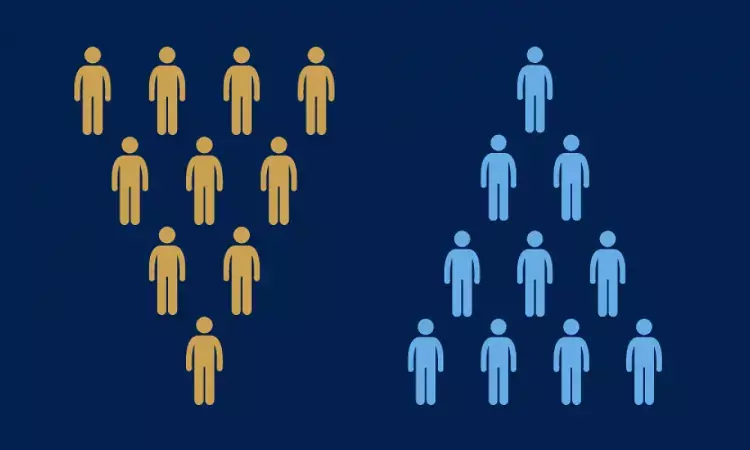- Home
- Medical news & Guidelines
- Anesthesiology
- Cardiology and CTVS
- Critical Care
- Dentistry
- Dermatology
- Diabetes and Endocrinology
- ENT
- Gastroenterology
- Medicine
- Nephrology
- Neurology
- Obstretics-Gynaecology
- Oncology
- Ophthalmology
- Orthopaedics
- Pediatrics-Neonatology
- Psychiatry
- Pulmonology
- Radiology
- Surgery
- Urology
- Laboratory Medicine
- Diet
- Nursing
- Paramedical
- Physiotherapy
- Health news
- Fact Check
- Bone Health Fact Check
- Brain Health Fact Check
- Cancer Related Fact Check
- Child Care Fact Check
- Dental and oral health fact check
- Diabetes and metabolic health fact check
- Diet and Nutrition Fact Check
- Eye and ENT Care Fact Check
- Fitness fact check
- Gut health fact check
- Heart health fact check
- Kidney health fact check
- Medical education fact check
- Men's health fact check
- Respiratory fact check
- Skin and hair care fact check
- Vaccine and Immunization fact check
- Women's health fact check
- AYUSH
- State News
- Andaman and Nicobar Islands
- Andhra Pradesh
- Arunachal Pradesh
- Assam
- Bihar
- Chandigarh
- Chattisgarh
- Dadra and Nagar Haveli
- Daman and Diu
- Delhi
- Goa
- Gujarat
- Haryana
- Himachal Pradesh
- Jammu & Kashmir
- Jharkhand
- Karnataka
- Kerala
- Ladakh
- Lakshadweep
- Madhya Pradesh
- Maharashtra
- Manipur
- Meghalaya
- Mizoram
- Nagaland
- Odisha
- Puducherry
- Punjab
- Rajasthan
- Sikkim
- Tamil Nadu
- Telangana
- Tripura
- Uttar Pradesh
- Uttrakhand
- West Bengal
- Medical Education
- Industry
Randomisation essential for preventing invalid, potentially misleading results in restorative dentistry

Researchers have found in a new study that randomisation is essential for preventing invalid, potentially misleading results in restorative dentistry.
The study has been published in British Dental Journal.
It has been argued that the randomised controlled trial design is unsuitable for restorative dentistry and that cohort studies or the analysis of large observational datasets without randomisation is more suitable. This opinion article examines why randomisation in clinical trials is needed and why big observational data is not enough for clinical inference.
It may sound plausible, and indeed it may be tempting, to view RCTs in restorative dentistry as something that is too expensive, too slow and rather unhelpful when its results are inconclusive, that is, when they yield no statistically significant results, particularly in the absence of a sufficiently large sample size. In contrast, observational data collected in the 'real world' of dental practice networks seems more appealing, particularly when the results of different restorative treatment types can so easily be compared in simple graphs and tables.However, the expedience of observational studies carries over to other fields as well, and is most certainly not limited to restorative dentistry, and in these other fields, randomised trials are used anyway, despite the added expense. Why is that? The answer is that it is recognised that the results of comparisons of groups formed without randomisation will, in general, have nothing in common with what would reflect the 'real world' in terms of therapeutic truth.
Mickenautsch, S., Berger, V. The role of the randomised controlled trial in restorative dentistry and the correct purpose of observational data. Br Dent J 226, 95–97 (2019). https://doi.org/10.1038/sj.bdj.2019.43
Dr. Shravani Dali has completed her BDS from Pravara institute of medical sciences, loni. Following which she extensively worked in the healthcare sector for 2+ years. She has been actively involved in writing blogs in field of health and wellness. Currently she is pursuing her Masters of public health-health administration from Tata institute of social sciences. She can be contacted at editorial@medicaldialogues.in.
Dr Kamal Kant Kohli-MBBS, DTCD- a chest specialist with more than 30 years of practice and a flair for writing clinical articles, Dr Kamal Kant Kohli joined Medical Dialogues as a Chief Editor of Medical News. Besides writing articles, as an editor, he proofreads and verifies all the medical content published on Medical Dialogues including those coming from journals, studies,medical conferences,guidelines etc. Email: drkohli@medicaldialogues.in. Contact no. 011-43720751


